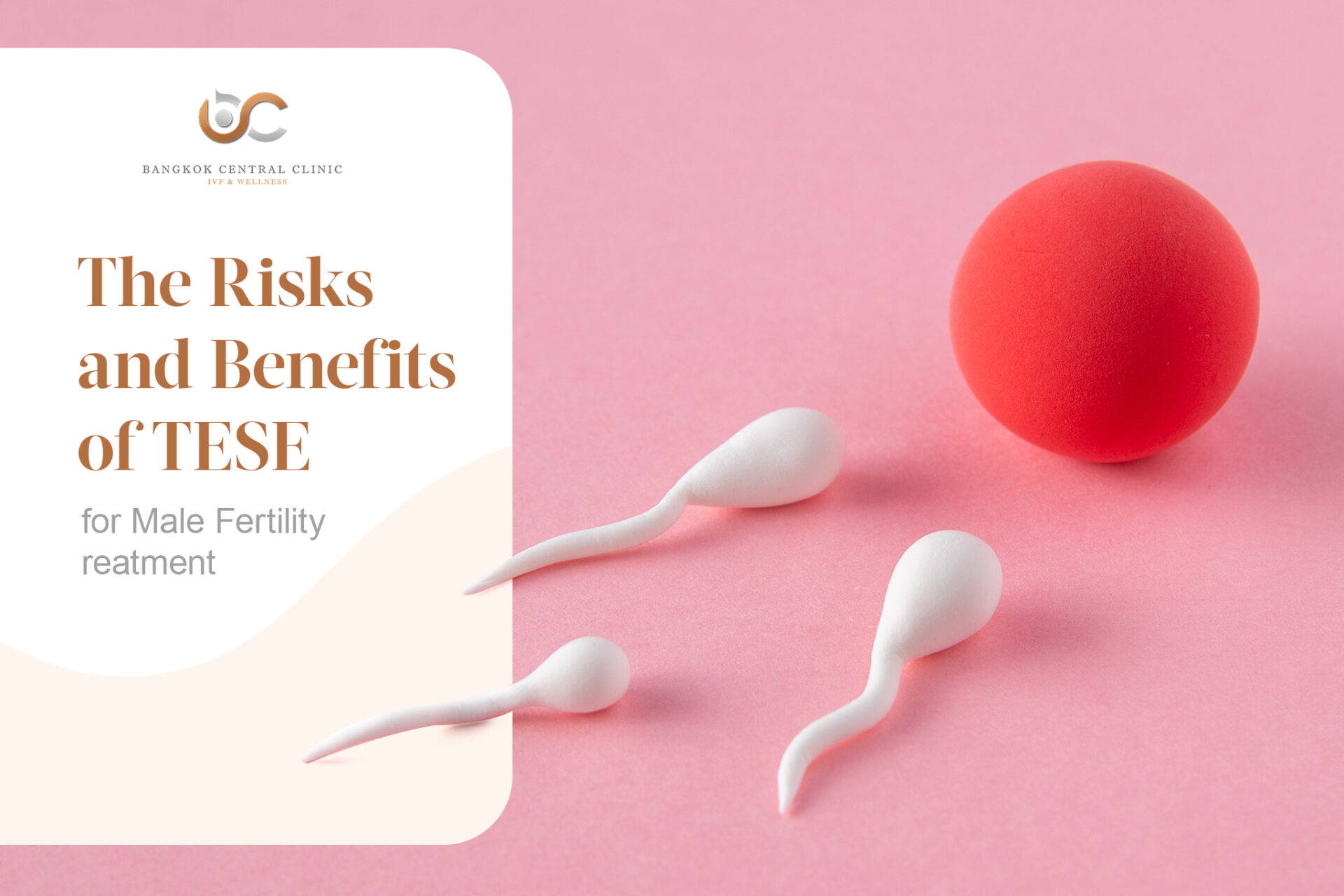HIGHLIGHTS
20 December 2020
5 yoga poses for couples to Enhance your relationship with your partner, level up your happiness in bed.
READ MORE20 December 2020
7 the procedure takes care of yourself and the wife before collecting eggs-collecting sperm.
READ MORE20 December 2020
Protein, a key nutrient of a woman, preparation for pregnancy- preparation for an egg collection.
READ MORE
Why Is It Important for a Health Check Up for Both Male and Female Before Getting Pregnant?
READ MORE
Destination IVF: Why Bangkok is a Premier Choice for International Patients Seeking Fertility Treatment
READ MOREThe Risks and Benefits of TESE for Male Fertility Treatment
 06 Feb 2024
06 Feb 2024

There are often obstacles on the road to becoming a parent, particularly when dealing with male infertility. Testicular Sperm Extraction (TESE), an assisted reproductive technology, may provide hope in situations when conventional approaches fall short. In this article, we discuss our perspectives on TESE, highlighting its benefits and some potential risks to consider.
Table of Contents
What is TESE?
A surgical technique called TESE is used to remove sperm straight from the testicular tissue. TESE covers both obstructive and non-obstructive azoospermia situations (where there are no sperm in a person’s semen), in contrast to Microscopic Testicular Sperm Extraction (microTESE), which takes a narrower approach. This intervention is important when natural sperm release is not possible, be it due to blockages or production challenges.
Diagnosing Male Infertility
Family planning is sometimes impeded by infertility conditions, which impacts both men and women. After months of trying, couples who are having trouble conceiving frequently turn to infertility diagnoses for guidance. Male infertility diagnosis requires a comprehensive evaluation that includes scrotum ultrasounds, blood testing, and semen analysis. These diagnostic instruments evaluate characteristics such as motility (about to move), morphology (the size and shape of sperm), sperm count, and semen volume, which provide the data required for customized fertility therapy programs.
Surgical procedures like sperm extraction may be an effective treatment for men who have particular difficulties with reproduction. PESA, TESA, and TESE are three surgical sperm extraction procedures that are customized for different circumstances including obstructive or non-obstructive azoospermia.
Explaining the TESE Procedure
A urologist, specializing in male reproductive health, performs the procedure by extracting a small tissue sample from the testicle. This sample is then carefully examined for the presence of viable sperm. The versatility of TESE allows for its application in various conditions.
What are the Possible Risks of TESE?
As with any medical intervention, TESE comes with some considerations. Possible risks include bleeding, infection, and post-procedural discomfort. Swift recovery is typically the case with TESE and patients are often able to resume normal activities within a short span.
Recovery and Future Prospects
The collected sperm after TESE can be frozen to be used in the future or used right away for fertilization. Although freezing may present certain difficulties, experts generally agree that the results are similar to using fresh sperm in modern reproductive techniques such as in vitro fertilization (IVF) or intracytoplasmic sperm injection (ICSI). If a second treatment is required, it is usually recommended to wait six to twelve months.
Charting the Path to Parenthood
TESE may be a promising solution for those facing the challenge of azoospermia. Surgical procedures provide hope where traditional techniques fail, thanks to technological advancements. Any procedure decision must carefully weigh the advantages and hazards, so don’t hesitate to get in touch with our fertility clinic in Bangkok for tailored guidance and information.
FAQ for TESE: The Risks and Benefits
How is Male Infertility Diagnosed?
Diagnosing male infertility involves a comprehensive evaluation. Couples struggling to conceive often seek guidance through infertility diagnoses. The process includes scrotum ultrasounds, blood testing, and semen analysis. Characteristics like motility, morphology, sperm count, and semen volume are assessed, providing essential data for customized fertility therapy programs.
What Surgical Procedures are Available for Male Infertility?
Surgical procedures play a crucial role in treating men with reproductive difficulties. PESA, TESA, and TESE are three customized sperm extraction procedures catering to various circumstances, including obstructive or non-obstructive azoospermia.
How is the TESE Procedure Performed?
A urologist, specializing in male reproductive health, conducts the TESE procedure by extracting a small tissue sample from the testicle. This sample is meticulously examined for the presence of viable sperm. The flexibility of TESE allows its application in diverse conditions, providing a tailored approach to male fertility issues.
What Happens After TESE?
The collected sperm after TESE can be frozen for future use or used immediately for fertilization. While freezing may pose certain challenges, experts generally agree that the results are comparable to using fresh sperm in modern reproductive techniques like in vitro fertilization (IVF) or intracytoplasmic sperm injection (ICSI). If a second treatment is needed, a waiting period of six to twelve months is usually recommended.
HIGHLIGHTS
20 December 2020
5 yoga poses for couples to Enhance your relationship with your partner, level up your happiness in bed.
READ MORE20 December 2020
7 the procedure takes care of yourself and the wife before collecting eggs-collecting sperm.
READ MORE20 December 2020
Protein, a key nutrient of a woman, preparation for pregnancy- preparation for an egg collection.
READ MORE
Why Is It Important for a Health Check Up for Both Male and Female Before Getting Pregnant?
READ MORE


















